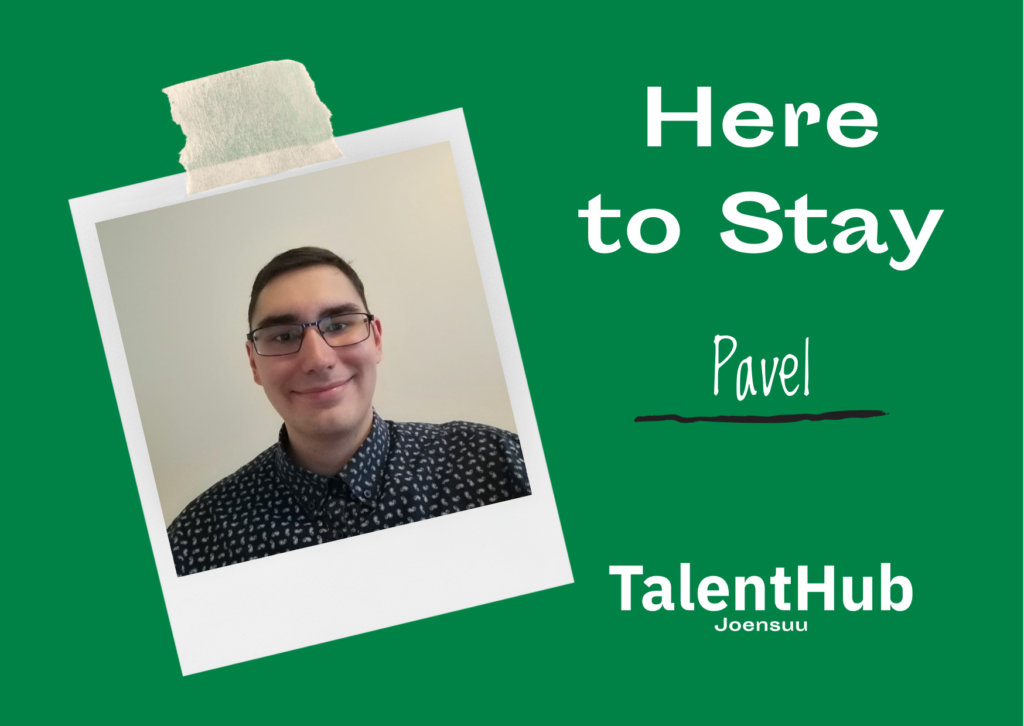Not all international talents cross oceans and continents for work or studies. Pavel Kipriianov is a student from Petrozavodsk who found his new home in Joensuu but a stone’s throw away from Russian Karelia – a place at once novel and exciting as well as delightfully familiar. Pavel is second-year biology student in UEF’s international master’s program, a member of the student union board and a prospective researcher. He is currently working on his thesis on plastic pollution, and is looking forward to hopefully working as a researcher in Finland.

Before moving to Joensuu for the long term, Pavel had already spent time abroad in exchange programs in the arctic regions of Norway and later in Finland.
“I was here on exchange actually in the autumn of 2019 for the semester. After that exchange I decided to apply here for my master’s.”
His first contact with Finland happened under less formal circumstances, however. Pavel is one of the many Russians who used to frequent the Eastern part of the country on shopping trips. Petrozavodsk, the capital city of the Karelian Republic, is only a 4.5‑hour drive away after all.
“I came to this town for shopping as a tourist many times, because we lived nearby. It was quite interesting. My exchange period changed some of my views, because I had thought life in Joensuu would not be so active. When I came here as an exchange student, I realised life here was much more interesting.”
Before his exchange semesters, Pavel had studied aquaculture in the Petrozavodsk State University. The decision to apply for the master’s program in Joensuu did not come out of nowhere.
“I got inspired after I had spent a semester here. I was also at the end of my bachelor’s studies in Russia and thinking about continuing abroad, but I had several places in mind. After the exchange here in Joensuu I just applied here again for my master’s. I also applied for some other Finnish cities, like Turku and Jyväskylä, but still decided to come here. I got to know some locals during the exchange. They were also one of the factors why I would come back to Joensuu. Because I already knew some people, it was easier for me to integrate.”
Pavel thus knew the lay of the land and had people he knew from his time as an exchange student to help him settle in, but there were practical questions he needed to address – not least of which was finding employment.
“I was mostly worried about getting a part-time job to provide for myself. I was also thinking about the language, but didn’t take it into too much consideration at that time. Now I realise how important it is. I was not so worried about integrating, since I had already been here, and I had some hints.”
Life across the border can be different in more ways than one. In both universities and at workplaces, life in Russia is more structured. While this can be true for some instances in Finland as well, the sense of hierarchy and social distance permeates all aspects of Russian society. In Finland, Pavel says, things feel more relaxed.
In Russia, Pavel worked summers in fish farms affiliated with his university. Since coming to Finland, he has fortunately had positive experiences with job searching. Pavel has managed to overcome language requirements and practical issues, and has since worked in food and paper delivery, the restaurant business and on the student union board.
“Even though it is a small town, it’s still possible to find a job even if you speak little Finnish or none at all, especially for a student. I worked in food delivery and paper delivery, and I also had a summer job in a restaurant, but that was not in Koli. In my case, it was not only about the language. When I arrived, I didn’t have a driver’s licence, but now I’ve got it. When I was applying for summer jobs with a car and a licence, I got more calls.”
Pavel gives the impression that Joensuu truly is ideal for him. The town is small, but not too small. He appreciates the ever-present nature around Joensuu and the easy access to the countryside. The architecture and planning of the city appeal to him, as do its well-kept parks and activity sites. His free time is spent exercising, fishing, foraging and travelling around the region and its many attractions. If he ever happens to need something from home or starts feeling homesick, hopping over the border is easy.
For now, Pavel is working on his master’s thesis on plastic pollution. In the future, he is looking to work as a researcher, but he also plans to keep an open mind should he find an opportunity to put his skills and knowledge to good use. All and all, things have gone well for Pavel. When asked what could be done to draw international professionals to Joensuu. Pavel offers multiple ideas for improvement, perhaps chief among them being specialised language courses.
“There are a number of possibilities, but maybe language courses. Every migrant is different. Maybe it’s easy to find language courses, but work-related courses might be a little bit harder to find.”
Lastly, Pavel brings up the city’s relationship to businesses and suggests a need for making the city more attractive to internationally oriented businesses.
“Migrants need work, so it would make sense if the city could generally attract more companies, especially big companies, and especially if the companies would work with international markets.”
Text: Lauri Vuori
